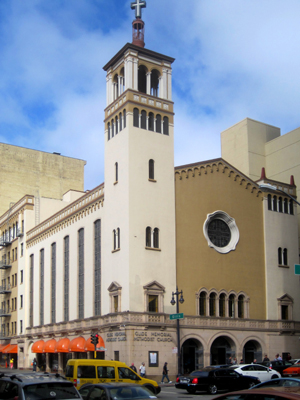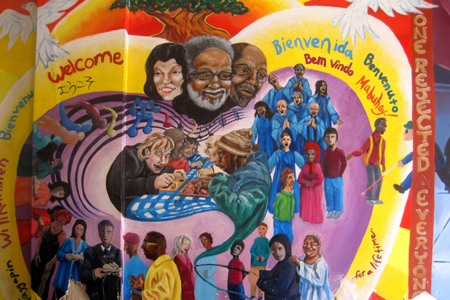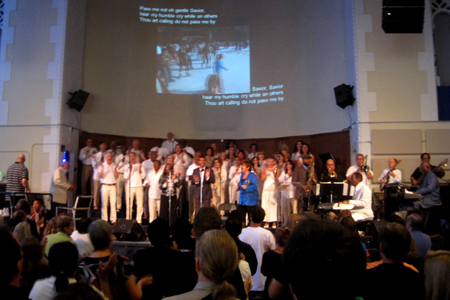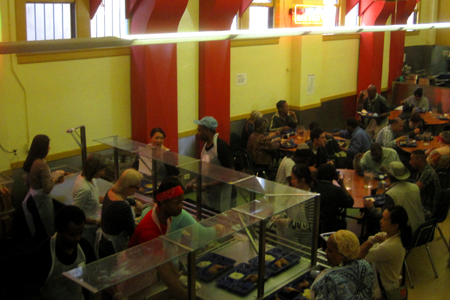| |
 |
 |
 |
| Comment on this report, or find other reports. |
 |
| Our Mystery Worshippers are volunteers who warm church pews for us around the world. If you'd like to become a Mystery Worshipper, start here. |
 |
| Find out how to reproduce this report in your church magazine or website. |
|
|
| 2761: Glide Memorial, San Francisco, California, USA |
 |
 |
 |
Mystery Worshipper: Portola.
The church: Glide Memorial, San Francisco, California, USA.
Denomination: United Methodist Church.
The building: Built in 1931 on land donated by Elizabeth Snyder Glide (known affectionately to all as Lizzie), widow of millionaire cattle baron Joseph Glide, this Italian Renaissance church stands as a landmark in downtown San Francisco. The dark wooden ceiling and the chandeliers are in the California Spanish Colonial style. The stained glass windows on the east side feature ornamental leaf patterns. There is no altar or pulpit; the front area is a stage with steps for the choir to stand on. In 1967 the Revd Cecil Williams, pastor from 1963 until 1999 and now pastor emeritus, stirred up considerable controversy when he ordered the cross removed from the sanctuary, exhorting the congregation to "stop crucifying Jesus" and instead to "love where love has never taken us." "We must all be the cross,"
he explained. Banners on the walls proclaim what Glide stands for, for example: "We are all precious and accepted people," "Unconditional love," "Freedom and Truth Liberation."
The church:
Glide refers to itself as "a radically inclusive, just and loving community mobilized to alleviate suffering and break the cycles of poverty and marginalization."
Founded as an ultra-conservative congregation, it was in its death throes by the 1960s as older members died off or moved away. But under the stewardship of Pastor Williams, Glide transformed itself into one of the most dynamic churches in the world, a transformation beautifully described on their website. Today Glide maintains more than 80 social service programs. They offer three free meals daily to those who would otherwise go hungry, averaging over 2500 meals per day, close to a million per year, prepared by a staff of 30 who are helped by thousands of volunteers. Glide also offers health care services to those who cannot afford them, including HIV testing, a chronic pain class, treatment of diabetes, mental health care, and treatment of substance abuse. The Mary Elizabeth Inn, founded by Lizzie Glide in 1914, still operates today to provide safe housing for women in need. There is a free drop-in legal services clinic; support groups to help men acknowledge and change violent behavior; services for youth, including homework help, computer instruction, creative and performing arts, field trips, and athletics – the list goes on and on!
The Glide Ensemble, their 100-plus voice gospel choir, (quoting from their website) "have sung before both presidents and the homeless, celebrities and nobodies, from Market Street to Shanghai."
The neighborhood: Glide is located in San Francisco's Tenderloin district, which started out as a residential area at the time of the Gold Rush in 1849. Almost totally destroyed in the great earthquake of 1906, the area was immediately rebuilt and quickly became notorious for its gambling, billiard halls, boxing gyms, speakeasies, and other such fixtures of the "soft underbelly" of the city ("Tenderloin", don't you know) – so memorably portrayed in such hard-boiled detective fiction as The Maltese Falcon (whose protagonist, Sam Spade, lived in the Tenderloin). As early as the 1930s the area became known for alternative sexual orientations, with sometimes violent confrontations between police and gays. Today the Tenderloin continues to be a seedy place, infested with squalor, homelessness, graffiti and tagging, crime, drugs, prostitution, vandalism, gang warfare. Glide confronts this situation head-on.
The cast: The Revd Cecil Williams, pastor emeritus; the Revd Dr Karen Oliveto, senior pastor and preacher; the Revd Theon Johnson III, associate pastor, the Revd Angela Brown, associate pastor; Janice Mirikitani, founding president of the Glide Foundation; Bernadette Williams; the Glide Ensemble, led by its musical director, John Turk, supported by soloists (Pastor Williams was the lead singer in the spiritual "Burdens down, Lord").
The date & time: September 7, 2014, 11.00am.
What was the name of the service?
Celebration.
How full was the building?
Capacity is 2000. Only a few empty seats were visible; however, I could not see how many were sitting in the balcony at the back. When first-time visitors were asked to identify themselves, almost half raised their hands. The members of Glide identified themselves and seemed to make up less than one-fifth of the congregation.
Did anyone welcome you personally?
A greeter gave us a handshake and a "Good morning."
Was your pew comfortable?
Yes.
How would you describe the pre-service
atmosphere?
At first there was quiet conversation. As the time of the service approached, the conversations became louder and more animated.
What were the exact opening words of the
service?
"Welcome to Glide! We are really happy you are here! And we mean it!"

What books did the congregation use during the
service?
No books. Everything was projected onto the front wall.
What musical instruments were played?
Two keyboards, two guitars, trumpet, trombone, saxophone, drums.
Did anything distract you?
Pictures and texts, which frequently had no apparent relationship to what was being sung or said, were projected onto the front wall during the entire service. This might be fine for people who find it boring to concentrate on just one thing, but I found it distracting.
Furthermore, some of these seemed to make subtle statements – for example, during one choir song the image of praying Muslims with the text "Allah is God” was projected above the choir.
Was the worship stiff-upper-lip, happy clappy, or
what?
At Glide one does not talk about service or worship, but rather about celebration, which is specifically a celebration of life.
The announcements and personal statements were presented in a conversational way, as though one were talking to friends in a living room. When the Glide Ensemble sang, the members of Glide stood up and clapped, raised their arms, swayed to the music (but the visitors seemed more restrained).
People were encouraged to turn on their electronic devices (but in silent mode) and participate in the service by means of Twitter and Facebook. It was also possible to contribute to the collection by using one’s phone to transfer money.
However, the most striking feature of the service was the absence of traditional religious language. There was no liturgy, no creed, no mention of faith, sin, salvation, Christ, Trinity, atonement. There were no Bible readings (except for biblical texts that were projected onto the wall). Instead of confession of sin, the people of Glide talk about "telling the truth about yourself." It is the choir who provided religious language and embodied worship, when they sang the words of a psalm or a traditional spiritual.

Exactly how long was the sermon?
21 minutes.
On a scale of 1-10, how good was the preacher?
8 – Pastor Oliveto delivered a powerful message with passion; no listener could ignore it. During the sermon, names of black victims of violence were read aloud, accompanied by drum beats. She referred to Herod's slaughter of the innocents (Matthew 2:16-18), fulfilling the prophecy of Jeremiah 31:15 (Rachel weeping for her children).
In a nutshell, what was the sermon
about?
Racism has not gone away, as many people would like to believe, but is as virulent as ever. The recent shooting by police of an unarmed black teenager in Ferguson, Missouri, shows this. Racism is a deadly way to control others. There are too many Rachels in this world, and too often they are black or brown. The most segregated hour in America used to be Sundays at 11.00am, when church services traditionally started. Today it is the noon lunch hour. We eat with people we love. Whom do you love? We need to respond to the Rachels of this world with an immediate willingness to share life's burdens with those whom we encounter.
Which part of the service was like being in
heaven?
The joyful singing of the Glide Ensemble: their expressive body language, supported by the instrumentalists and soloists, was the heart and soul of this service for me. The vibrant energy of their singing was compelling. The fact that this singing occurs in a church located in a seedy, crime-ridden, poverty-stricken, inner-city neighborhood, which Glide serves so comprehensively, adds depth to the vitality that this choir radiates.
And which part was like being in... er... the other place?
After the service I happened to see the dining room in the basement, where disadvantaged people were eating one of the free meals that Glide provides daily. I thought: "There, but for the grace of God, I am sitting." However, this trivial, pious thought could not begin to bridge the gap between me and the diners. Experiencing this abyss that separates me from the Lazaruses of this world is the epitome of being in "the other place."

What happened when you hung around after the service looking lost?
In a congregation of 2000 people, many of whom were one-time visitors, it is not possible to attract attention by appearing to be lost.
How would you describe the after-service
coffee?
Tea, water and home-made cake were offered in the Freedom Hall, the fellowship hall under the sanctuary. The tea was OK. There were also tables that offered information about Glide, souvenirs such as t-shirts, and books. I had the honor of meeting Pastor Cecil Williams and shaking his hand.
How would you feel about making this church your regular (where 10 = ecstatic, 0 = terminal)?
6 – The service was impressive, especially because it was backed up by at least 50 years of massive outreach to the community. The comprehensive, energetic programs that the congregation carry out for the sake of the poor and disadvantaged give this church an irresistible appeal. It is impossible to leave the celebration without asking oneself: what can I do to support this astounding ministry? However, the style and content of the Glide celebration could not sustain me on a regular basis. If I am not mistaken, there seems to be no place at Glide for baptism or holy communion. I need a more old-fashioned church in which traditional liturgy and hymns, the sacraments, biblical interpretation and theological reflection are an integral part of the service. I was reminded of the Lutheran theologian Dietrich Bonhoeffer, who was arrested 1943 in Nazi Germany for his involvement in a conspiracy against the regime. As he sat in prison, he wrote about his vision of a "religionless Christianity" that does not require people to be religious in order to participate in the gospel. He envisioned a future Christianity "limited to two things: prayer and righteous action among men." Perhaps Glide has realized this vision; or perhaps they have created a new religion.
Did the service make you feel glad to be a
Christian?
It could be argued that Glide does not have an explicit Christian identity. But nevertheless, yes. The Glide congregation use striking language to describe what they stand for: "radically inclusive," "unconditional love," "respect and acceptance of everyone," "alleviate suffering" – these are not empty phrases here. This spoke to my heart and conscience and expressed for me the glory of the gospel.
What one thing will you remember about all this in seven days' time?
Meeting Pastor Cecil Williams after the service, a living legend in San Francisco. |
|
|
 |
 |
 |
| We rely on voluntary donations to stay online. If you're a regular visitor to Ship of Fools, please consider supporting us. |
 |
 |
 |
| The Mystery Pilgrim |
 |
| One of our most seasoned reporters makes the Camino pilgrimage to Santiago de Compostela in Spain. Read here. |
 |
 |
 |
| London churches |
 |
| Read reports from 70 London churches, visited by a small army of Mystery Worshippers on one single Sunday. Read here. |
| |
|
|
|
|


